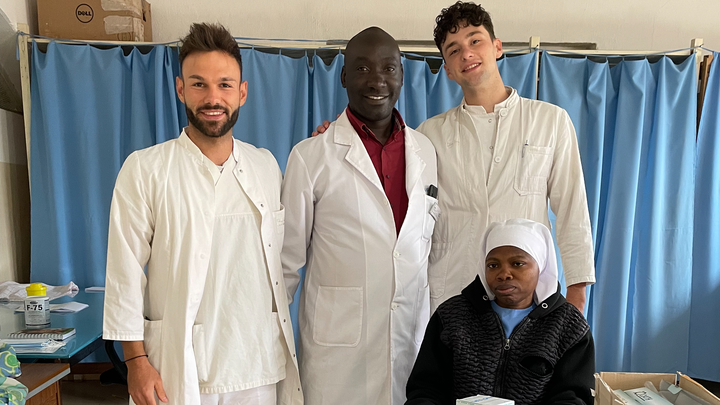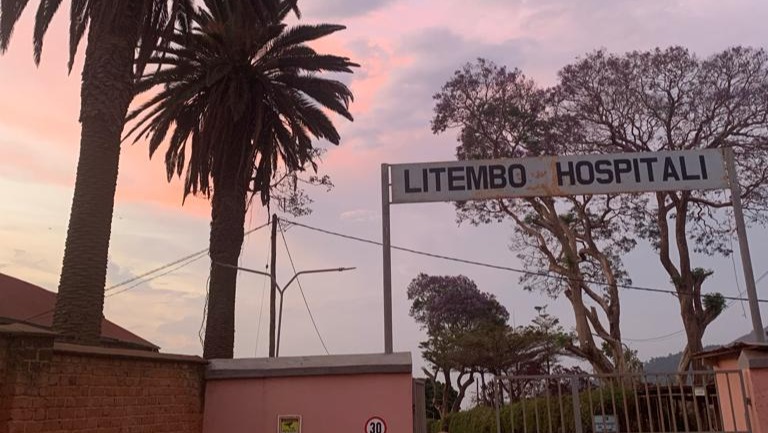
Saving lives together – Healthcare for Litembo
Donation protected
english version below!
Wir, das sind Lukas Baumert (22) und Maximilian Weber (28) –sind zwei Medizinstudenten aus Tübingen und praktizierten zwei Monate in einem abgelegenen Krankenhaus im tiefen Süden Tansanias – dem Litembo Hospitali. Die Stuttgarter Zeitung berichtete bereits über unsere Erfahrungen („Das stumme Weinen von Litembo “) und nun möchten wir gemeinsam mit Ihnen Spenden für Litembo sammeln!
Wen unterstützen Sie mit Ihrer Spende?
Das Krankenhaus im Dorf Litembo liegt abgeschieden auf 1700 Meter Höhe. Die Krankheiten und Unfallverletzungen in dieser von Kaffee anbauenden Kleinbauern und Fischern bewohnten Region nahe des Malawi-See sind gravierend, das Gesundheitssystem aber äußert limitiert: Das 300-Betten-Hospital Litembo, getragen von der katholischen Diözese Mbinga, ist zuständig für eine Region mit 500.000 Menschen, das heißt, auf 10.000 Menschen kommen 6 Betten, in Deutschland sind es 60 Betten. Hinzu kommt eine besonders hohe Kindersterblichkeit: Laut UNICEF sterben in Tansania 43 von 1000 Kindern, bevor sie das fünfte Lebensjahr erreichen, in Deutschland sind es 4 Und über Tansanias Gesundheitssystem analysiert das Bundesministerium für wirtschaftliche Zusammenarbeit bitter: Trotz der wachsenden Bevölkerung seien die staatlichen Ausgaben dafür gesunken: „Es herrscht ein großer Mangel an Fachkräften, das Gehaltsniveau ist niedrig, die Ausstattung der Gesundheitseinrichtungen ist schlecht.“

Die Patienten reisen von 50 Kilometer und weiter nach Litembo – es sind stundenlange Fahrten. Es gibt vier Ärzte und ein Dutzend Ärzte im Praktikum - die praktisch die Hauptlast der Arbeit tragen – einige Nonnen und wenige Krankenschwestern, denn es sind die Angehörigen, die die Patienten waschen, ihnen Essen zubereiten, vor der Klinik campieren und übernachten. Das medizinische Personal ist stets bemüht mit vorhandenen, begrenzten Mitteln Patienten grundlegend zu versorgen. Doch mit nur einem Röntgengerät/Ultraschalgerät und keinem MRT/CT stoßen sie damit schnell an ihre Grenzen – denn bei den häufigen Unfällen mit Motorrädern oder den Kleinbussen „Daladala“ hilft das manchmal nicht weiter. Wir sahen oft Schädel-Hirntraumata oder Oberschenkelfrakturen bei jungen Leuten. Einen Neurochirurgen hat die Klinik nicht, bei einer Hirnblutung muss man konservativ behandeln - hier ist die fehlende moderne Bildgebung (CT/MRT) eigentlich unverzichtbar.
Auch Verbrennungen und Vergiftungen sind an der Tagesordnung. Teilweise wird an Feuerstellen gekocht, was zu schlimmen Verbrennungen oder vernarbten Beinen führt. Die Vergiftungsfälle sind hauptsächlich Suizidenten, die Unkrautvernichtungsmittel (Parathion oder E605) oder Batteriesäure schlucken. Oft mussten wir den Magen der Patienten auspumpen – für alle Beteiligten eine sehr bedrückende Situation.
Der ökonomische Druck ist bei Monatseinkünften von umgerechnet 30 Euro hoch. Bei Suiziden gebe es eine so hohe Rückfallquote, dass die Klinikleitung neuerdings Gespräche anbiete, um innerfamiliäre Konflikte zu vermeiden.


Wie werden Ihre Spenden eingesetzt?
Viele Patienten können Ihre Behandlung nicht bezahlen. Für diese hat das Krankenhaus einen mit Spenden gespeisten Notfallfonds aufgelegt – aber der reicht oft nicht aus. Aus finanziellen Gründen müssen Patienten häufig auf Schmerzmittel verzichten – wir finden, das darf nicht sein! Mit Ihrer Spende ermöglichen den Bewohnern Litembos Zugang zu überlebenswichtiger, grundlegender medizinischer Versorgung.
Der Chefarzt Freddy Mwalutende sagt in einem Interview: „Dies ist eine sehr abgelegene Gegend und die Menschen sind arm.“ Da sei es schwierig, zwischen den Kosten für Medikamente und Behandlung sowie dem ökonomischen Status der Patienten eine Balance zu finden. Spenden, besonders aus Deutschland, komme da eine große Bedeutung zu.
Vom tansanischen Staat erhält das Litembo Hospitali keine regelmäßige Förderung. Das Krankenhaus bedarf jedoch dringend eine Modernisierung hinsichtlich überlebenswichtiger medizinischer Geräte, die für die Menschen in der Region unverzichtbar sind. Zudem konnten wir bereits ein weiteres Ultraschallgerät, sowie Patienten-Überwachungsmonitore organisieren, die nun nach Litembo verfrachtet werden müssen.


Wie kommen Ihre Spenden nach Litembo?
Ein stabiler Partner für das Litembo-Hospital ist die Diözese Würzburg, die seit Jahren eine Partnerschaft mit der Diözese von Mbinga hat und die über ihre „Weltkirche“ auch Spenden annimmt und nach Litembo weitergibt. Man unterstütze neben dem Hospitali auch Landwirtschafts- und Frauenprojekte. Wir stehen in engem Kontakt mit Herrn Burkhard Pechtl, dem Afrikareferent der Diözese und planen selbst im April 2025 gesammelte Spenden in Litembo persönlich zu überreichen.
Ihre Senden gelangen somit transparent und ohne Umwege direkt an das Krankenhaus und den Geschäftsführer, Pfarrer Raphael Ndunguru.
Wir sagen Asante Sana/Vielen Dank!
Lassen Sie uns gemeinsam Großes bewirken – mit Ihrer Unterstützung in Form von Spenden können wir gemeinsam Großes in Litembo bewirken: So ermöglichen Sie den Menschen vor Ort einen nachhaltigen Zugang zu überlebenswichtiger grundlegender medizinischer Versorgung sowie ein Hauch Exzellenzmedizin aus der Heimat. Raphael Ndunguru und das Litembo-Hospital sagen „Asante Sana/Vielen Dank“ nach Deutschland!
Für zusätzliche Informationen/Vorträge stehen wir jederzeit zur Verfügung und freuen uns über Ihre Nachricht!

-

---------------------------english version---------------------------
We, Lukas Baumert (22) and Maximilian Weber (28), two medical students from Tübingen, spent two months practicing in a remote hospital in southern Tanzania – the Litembo Hospitali. The newspaper Stuttgarter Zeitung has already reported on our experiences ("The Silent Tears of Litembo ") and now we would like to collect donations for Litembo together with you!
Whom are you supporting with your donation?
The Hospital in the village of Litembo is located remotely at an altitude of 1700 meters. The diseases and traumatic injuries in this region, inhabited by coffee-growing small farmers and fishermen near Lake Malawi, are severe, but the health system is extremely limited: The 300-bed Litembo Hospital, supported by the Catholic Diocese of Mbinga, serves a region of 500,000 people, meaning there are 6 beds for every 10,000 people, compared to 60 beds in Germany. In addition, there is a particularly high child mortality: According to UNICEF, in Tanzania, 43 out of 1000 children die before they reach the age of five, compared to 4 in Germany. The Federal Ministry for Economic Cooperation and Development (BMZ) describes Tanzania's health system as bitter: Despite the growing population, government spending has decreased. "There is a great shortage of skilled workers, the salary level is low, and the equipment of health facilities is poor."
Patients travel from 50 kilometers and further to Litembo – it's hours-long journeys. There are four doctors and a dozen interns who practically bear the brunt of the work – some nuns and a few nurses, as it is the relatives who wash the patients, prepare their food, camp outside the clinic, and spend the night. The medical staff always strives to provide basic care to patients with existing, limited resources. However, with only one X-ray machine/ultrasound machine and no MRI/CT scans, they quickly reach their limits – because sometimes, they don't help with the frequent accidents involving motorcycles or minibusses "Daladala." We often saw head injuries or thigh fractures in young people. The clinic does not have a neurosurgeon, and for a cerebral hemorrhage, one must treat conservatively - here, the lack of modern imaging (CT/MRI) is indispensable, ultimately causing death.
Burns and poisonings unfortunately are a common occurrence. Cooking over an open fire sometimes leads to severe burns or scarred legs. Poisoning cases are mainly suicide attempts, where people ingest pesticides (Parathion or E605) or battery acid. Often we had to pump the patients' stomachs – a very distressing situation for all involved.
The economic pressure is high with monthly incomes equivalent to 30 euros. There is such a high relapse rate in suicides that the clinic management now offers conversations to avoid intra-family conflicts.
What happens with your donation?
Many patients cannot afford their treatment. For these, the hospital has set up an emergency fund funded by donations – but often, it is not enough. For financial reasons, patients often have to forego pain medication – we believe, that should not be the case! With your donation, you enable the villagers of Litembo much needed access to basic healthcare.
Chief physician Freddy Mwalutende says in an interview: "This is a very remote area, and the people are poor." It is difficult there to find a balance between the costs of medication and treatment and the patients' economic status. Donations, especially from Germany, play a significant role here.
The Litembo Hospital receives no regular funding from the Tanzanian government. However, the hospital urgently needs modernization in terms of life-saving medical equipment, which is indispensable for the people in the region. In addition, we have already been able to organize another ultrasound machine and Patient-Monitoring equipment, which now need to be transported to Litembo.
How do your donations reach Litembo?
A stable partner for the Litembo Hospital is the Diocese of Würzburg, which has a partnership with the Diocese of Mbinga for years and accepts donations through its "World Church" and passes them on to Litembo. Besides supporting the hospital, they also support agriculture and women's projects. We are in close contact with Mr. Burkhard Pechtl, responsible for Africa-Relations of the diocese, and plan to personally hand over donations collected in Litembo in April 2025. Your donations thus reach the hospital and the managing director, Father Raphael Ndunguru, transparently and direct.
We say Asante Sana/Thank you very much!
Let's make a big difference together – with your support in the form of donations, we can achieve great things in Litembo together: You enable the people of Litembo to have sustainable access to essential basic medical care ultimately Raphael Ndunguru and the Litembo Hospital say "Asante Sana/Thank you very much" to Germany! We are available for additional information/presentations at any time and look forward to your message!
Organizer
Lukas Baumert
Organizer
Tübingen, Baden-Württemberg